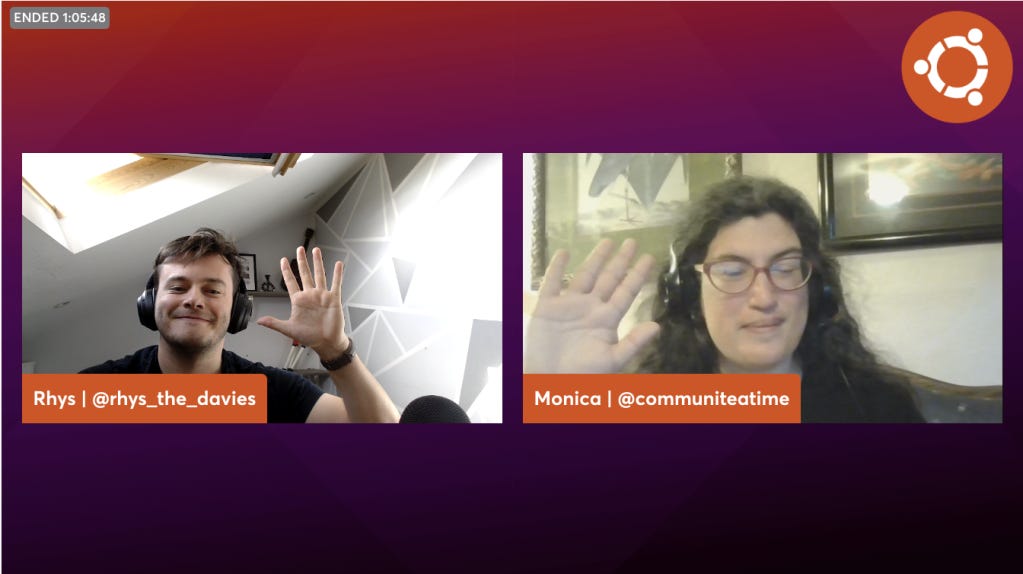UbuntuOnAir update
A run down of what's been going on with UbuntuOnAir since we brought it back
It’s been a couple of months since we restarted UbuntuOnAir. We had a few ideas, and lots of aspirations, but we wanted to be realistic and work our way up. You can read about why we brought it back and why we didn’t use the more mainstream channel “Celebrate Ubuntu” elsewhere. Here I talk about some of the things we’ve done, some of the lessons we’ve learnt, and what’s next. If at any point you become curious and want to watch the videos head to ubuntuonair.com and scroll through.

Office hours
The ‘Community office hours’ videos have been our centerpiece. Every week Monica (@communiteatime) and I sit down to hold office hours where we talk about what’s been going on in the community and take questions. Often, we’ll be joined by a guest(s), community members who have kindly agreed to join us for a chat about the interesting community stuff they’ve been up to. These are probably the most fun, and provide a lot of insight into what the guest is doing but also into the breadth of ways people contribute to Ubuntu.
If you were to watch the first office hours and then the latest office hours you’d spot some differences. But a lot of the lessons we’ve learnt aren’t on the stream at all. As you’ll be able to see we’ve introduced more structure, I wouldn’t say it’s quite got its own ‘format’ yet but we’re getting there. We’ve become more comfortable with the stream and the chat. In the beginning there was lots of um-ing and ah-ing but now that we’ve found our feet, technical issues and general smoothness aren’t a problem.
Behind the scenes, though, is where I’m really proud of the progress. Some of it, yes, we could have anticipated and put in place already, but we wanted to get started. Release early, release often, etc. At the beginning of each week we’ll sit down and go through a checklist. We’ll schedule the stream, we’ll create a discourse post, we’ll tweet about it (with emojis) and we’ll let everyone know the plan, whether it’s a guest episode or otherwise. We have a nice little spreadsheet where we track all of our guests, plans for the future, various tweet copy, and events. It might not seem like much but it’s there, and we’re using it, and it’s helpful.
Desktop Indabas
“Indaba” is a South African word for a meeting or a conference of important people. And on the last Friday every month, that’s exactly what happens. The Desktop team’s own Heather Ellsworth (hellsworth) sits down with another member of the team and a member of the community to talk about a specific aspect of the Ubuntu Desktop. Monica or I will sometimes join in too. The first Indaba turned out to be a roaring success, pulling in more views in the first few days than the rest of the videos to this day! And we find that they’re very well received by the community as a nice touch base to ask questions to the team.
We’ve learnt a few things from doing these. There’s some overlap in preparation and smoothness with what we’ve learnt from the office hours but also two notable other things. The words ‘Ubuntu Desktop’ attract a lot of people, some of which are less than welcoming. Moderation is important. We also found that month after month a lot of the same questions get asked. Because of this, we’ve added a page to record repeat questions to the previously mentioned spreadsheet. This way, like the most recent Indaba, we can put together a stream to specifically address popular (or even controversial) topics.
And of course we’ve learnt that handing the reins to someone else was a great idea. We still support Heather a little bit but she does a wonderful job of organising the guests, collecting questions from various places, and hosting the show. If Monica and I weren’t there, this show would go on. And that’s what we want.
Other stuff
We’ve done other things too, not as much as I’d have liked, but some. We’ve done a ‘gaming’ stream, a tutorial about making tutorials, and a chat with the engineers behind Ubuntu on the Raspberry Pi. They were all one offs but with the potential to become a series/playlist with return appearances.
There’s a sizeable difference in the engagement figures with these videos though. The Raspberry Pi video did significantly better, both in terms of views and general engagement. We tracked this down to three factors; consistency, relevancy, and marketing.
The consistency factor is inferred, since the other videos we do have are all part of a consistent series and these are not. The relevancy factor is really unavoidable, from my work on Ubuntu on Raspberry previously I know that if you put ‘Raspberry Pi’ in a headline it’s going to do well. And marketing. In the beginning we promoted the videos more openly. That isn’t to say we don’t still, but we have more things to promote now so it feels like the traffic to the videos is cannibalising itself. Some food for thought.
What’s next?
As you’ve read, there’s much more to do and we’re still learning. I.e if we can get the schedule sorted more in advance we can do much more to spread the word etc. But, it’s only been a couple of months and I think it’s fair to say we’re on the right track. Growth is slow but steady:
Next, we’d like more. MORE. And we’d like your help. The Ubuntu community is wide and interesting with lots of people doing interesting things. We’d like to hear from you.
At the end of the first UOA blog post we did a very generic call for contribution for people interested in helping us find our feet. Now that they’re under us we want to make that call more specific. We’re looking for people to host and run a recurring show. Like the Desktop Indaba it can be monthly, or perhaps fortnightly if you’re keen, where you talk about, or do something related to, Ubuntu and how you contribute. If nothing else it’s a challenge for you to be consistent and create something on a regular basis. We will support you and help you find your feet, but if you have an idea, let us know.

It can last however long you like and be as niche or generalist as you can make it. The only conditions are that it must be in some way Ubuntu related, and that it’s for the community. Some examples might include:
- Live code-along tutorials
- Live streamed or pre-recorded time lapses of illustration
- Application reviews
- An hour of bug fixing
If this is something that interests you let us know by replying to this thread on Discourse or by messaging me directly. Don’t worry about polish or things like audio and video quality just yet, we can think about that down the line. For now, we’d just love to see people giving it a go and using the platform for what it’s intended. See you OnAir.
